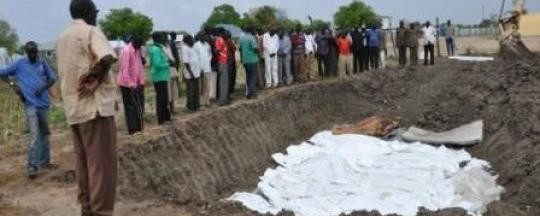S. Sudan lawyers call for public memorials for victims of atrocities

The South Sudan Law Society (SSLS) has called for public memorials to be built in South Sudan to honor victims of historical and recent massacres.
In a paper written by South Sudanese lawyer David Deng, the SSLS says that public "memorialization" will help South Sudanese citizens in their process of healing and reconciliation.
“In order to secure a lasting peace, South Sudan must reckon with its history of massive human rights violations,” Deng's paper, which is available for download in full below, reads. “Memorialization initiatives should be an integral part of any such process.”
Deng explains that “memorialization” is the process where a society acknowledges past human rights abuses and uses them to teach about historical and ongoing injustices.
Memorialization can take the form of museums, monuments, or archives of evidence of atrocities. It can also include public performances such as reading aloud the names of the dead.
Deng says that such public projects are helpful tools for countries engaged in or emerging from conflict to help citizens remember past crimes and to prevent them from happening again.
Other countries which have undergone memorialization include South Africa after Apartheid and Peru after the Shining Path rebellion.
In those and other places, memorialization took place alongside Truth and Reconciliation commissions which researched, acknowledged, and publicized crimes as part of the process of transitional justice.
‘To remember their loss’
Deng says that memorials can be constructed at locations where atrocities occurred including massacre sites, detention facilities, and mass graves.
“People who lost loved ones can come to these places to remember their loss and seek healing,” he writes. “People may also visit the sites to better understand the events that took place and engage in discussions about how to prevent similar occurrences in the future.”
There are many such sites across South Sudan, Deng says. He cites the Giyada military barracks which was a central location of human rights abuses committed during the previous Sudanese Civil War, and the police station in Gudele where state security forces killed hundreds of people in December 2013.
Deng writes that while the war continues in South Sudan it is important to protect mass graves and other sites for future remembrance and to thoroughly document human rights violations.
Uniting, not dividing
Memorialization projects are difficult to accomplish, the paper says, because they must be transparent and must acknowledge crimes committed by all groups.
“Poorly planned memorialization activities sometimes make the mistake of identifying particular groups as victims and ignoring abuses committed against other groups, thereby becoming tools…that serve to divide rather than unite,” Deng writes. “Other times, they glorify as heroes and liberators people who have committed serious abuses during the conflict.”
“There is often a temptation in transitional states to use memorials to obscure a history of state-sanctioned human rights abuses and control definitions of victims and perpetrators,” he continues. “Memorials should not be used to further these sorts of political agendas.”
Photo: A mass grave in Bor, Jonglei, 10 February 2014 (Radio Tamazuj)
For breaking news updates from Radio Tamazuj ‘like’ our page on Facebook, follow us on Twitter, or subscribe to our RSS feed.